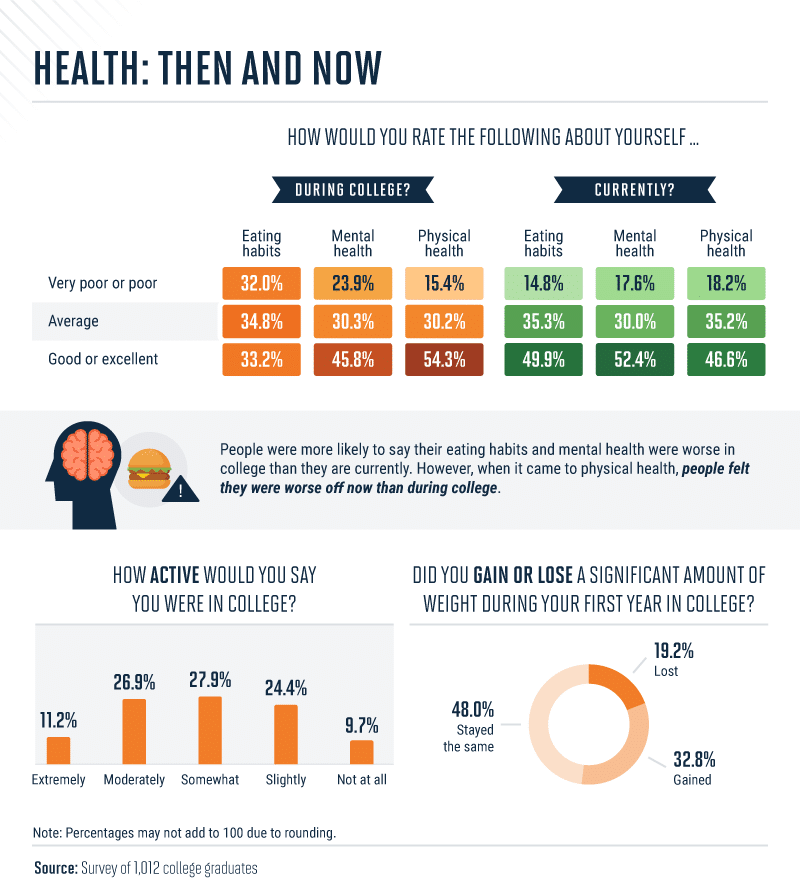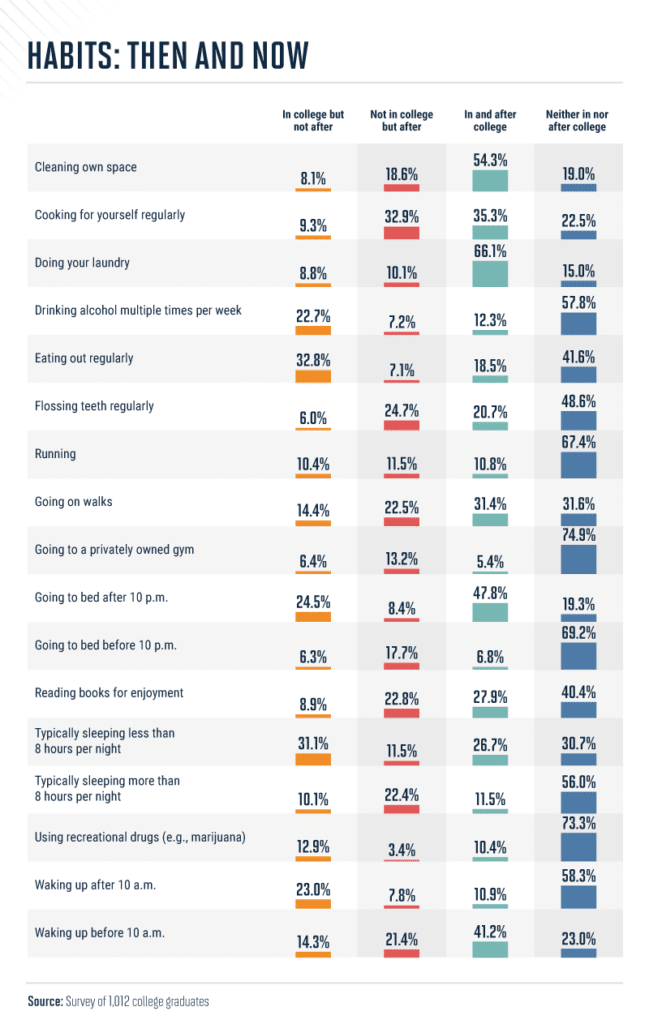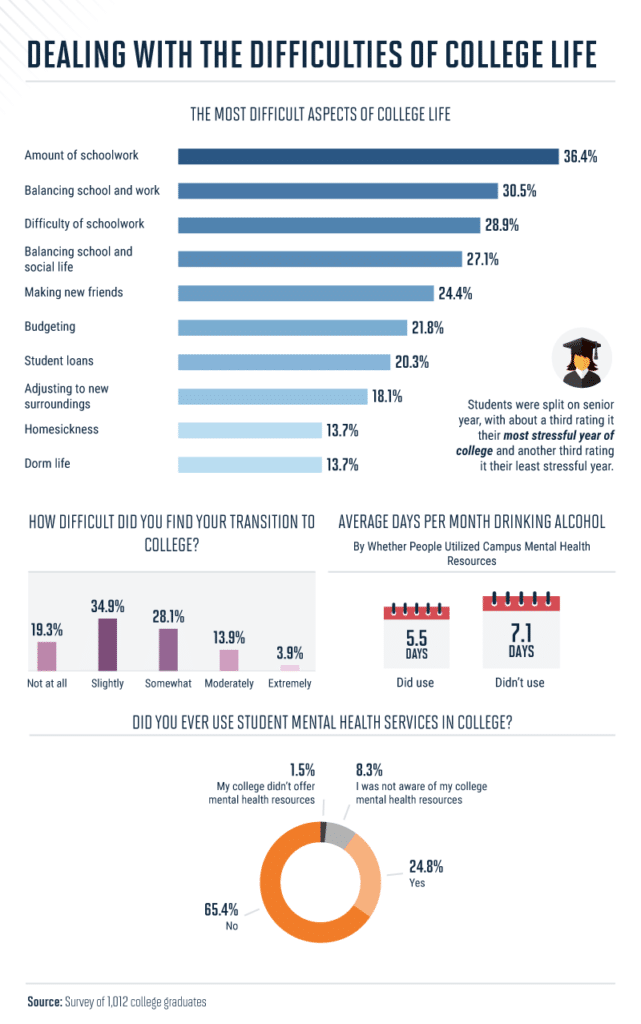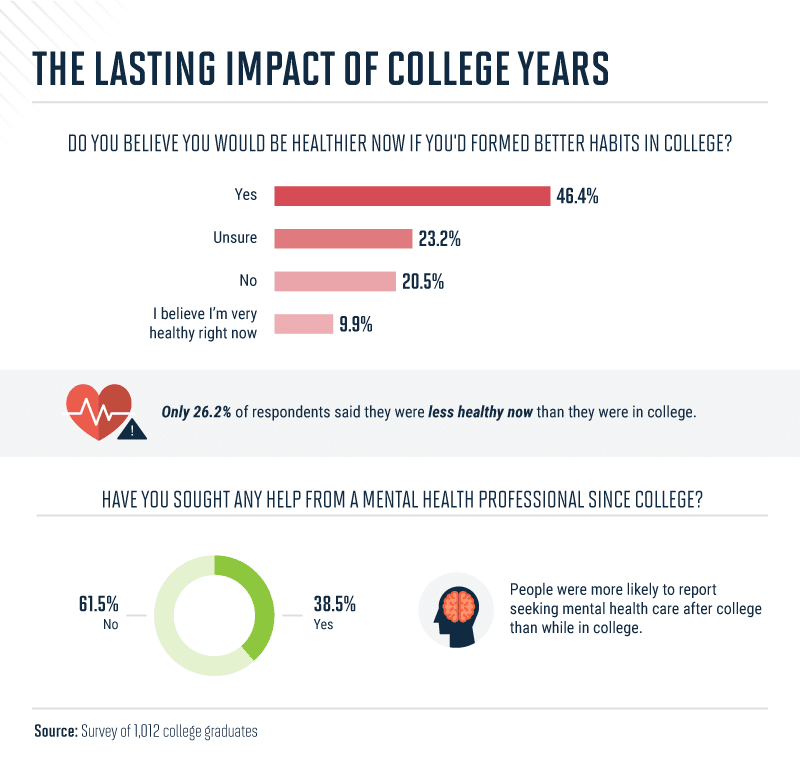
College is typically seen as an important stepping stone to full-fledged adulthood, with many people on their own for the first time and taking on new responsibilities. A major example of this is being solely responsible for one’s health.
Stereotypes of college characterize it as a time of late-night pizza while studying and free-flowing beer at parties. While these stereotypes may ring somewhat true, lack of time, stress, and the accessibility of junk food are also among common barriers college students face to developing healthy eating habits. Additionally, health isn’t limited to the physical, and it’s just as important for college students to tend to their mental health. This has been especially true as attention has been called to just how stressful school can be for students. Plus, the impacts of the COVID-19 pandemic surely haven’t helped.
To learn more about how people managed their health during college and how the habits they developed in school have impacted their behavior after graduation, we surveyed over 1,000 college graduates on their health habits while in school. We also looked at how their current physical and mental health compare to their collegiate days. To find out more, read on.
Health in College and Beyond

While college can be seen as the start of adulthood, life looks a lot different once you have a diploma in hand. To start, we looked at how college graduates rated their mental and physical health, including their eating habits, during college and now.
People were more likely to say their eating habits and mental health are good or excellent currently, compared to their college years. It’s hard to imagine that any college student enters their first year without hearing about the “Freshman 15.” While many will not experience that amount of weight gain – or any at all – eating habits have a lot to do with this. Thirty-two percent said they’d rate their college eating habits as poor or very poor. Meanwhile, 32.8% of the college grads surveyed said they’d experienced weight gain in their first year of college.
When it came to physical health, people were less likely to rate it as good or excellent now versus college. Over 90% of people reported being at least slightly active in college. With the freedom of being able to create an individualized schedule in college, it can be more difficult to find time for exercise when people eventually move into the workforce.
Evolving Habits

In examining people’s health habits and how college may have impacted them, we were particularly interested in seeing how people’s current habits compare to their college days. Respondents were asked about a variety of habits and whether they had them in college or now – or both.
Some of the biggest differences we saw in people’s habits involved sleep and dining out. Nearly 26% of people said they made a habit of going to bed after 10 p.m. in college but have changed their ways since graduation. Additionally, 17.7% said they hadn’t been good about going to bed before 10 p.m. in college but turned over a new leaf afterward. It’s encouraging to hear that people start taking their sleep more seriously beyond college, but studies have shown increasing numbers of students aren’t getting enough sleep, which can impact academic performance.
Dining out was another habit that seemed to change as people moved past their college life. Almost 1 in 3 people said they ate out regularly during college, but cut back after they finished school. Restaurant food is typically higher in calories than people need, which can lead to undesirable health impacts.
College and Mental Health

College often comes with an adjustment period as students acclimate to a new environment and new academic expectations.
We asked graduates about the most difficult aspects of college for them, instructing them to designate up to three main stressors. Schoolwork topped the list, with 36.4% of people saying it was a struggle for them. This was followed by 30.5% of people reporting that juggling both school and a job was challenging. Rounding out the top three, 28.9% of people said the difficulty of their coursework made college life difficult.
Over 80% of people said they found the adjustment to college at least slightly difficult. There are ways people can walk into their college career feeling more prepared, such as researching potential majors and working on social skills.
If students find themselves struggling, many campuses offer mental health care options that students can utilize. In fact, 24.8% of college grads reported using campus mental health resources while they were in school. These resources are proving to be increasingly important but, unfortunately, have historically been underfunded with demand usually exceeding supply.
Life Beyond the Classroom

Finally, we wanted to look at how people believe their college health habits impacted where they are with their health today. Just over 46% of people said they believe they’d be healthier right now if they had formed better habits during their college years. However, nearly 1 in 10 people said they already consider themselves very healthy.
Additionally, it appeared that more people were seeking mental health assistance after their college careers ended. Roughly 39% of people said they’d sought help from a mental health professional (compared to the 24.8% who did so in college). Mental health therapy can prove helpful for myriad issues, from day-to-day stress to addiction, regardless of where a person is in their life.
Methodology
We surveyed 1,012 college graduates about their health habits both in college and now. Respondents were 51.5% women and 47.6% men. One respondent was agender, seven were nonbinary, and one respondent chose not to disclose their gender. The average age of respondents was 33.1 with a standard deviation of 10.6.
When reporting the difficulties they experienced in college life, people were instructed to select up to three options.
Responses to questions about days per month engaging in specific behaviors were validated in the survey process to control for outliers.
Limitations
The data we are presenting rely on self-report. There are many issues with self-reported data, including the following: selective memory, telescoping, attribution, and exaggeration.
Fair Use Statement
College can be a pivotal time for people to build health habits that they carry into their life beyond graduation. If you know someone who would benefit from the information in this project, you are free to share for any noncommercial reuse. We do ask that you link back here so the entire project and its methodology can be viewed. This also gives credit to the contributors who make this work possible.

